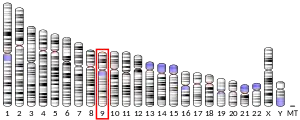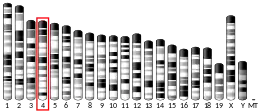| FKTN | |||||||||||||||||||||||||||||||
|---|---|---|---|---|---|---|---|---|---|---|---|---|---|---|---|---|---|---|---|---|---|---|---|---|---|---|---|---|---|---|---|
| Identifiers | |||||||||||||||||||||||||||||||
| Aliases | FKTN, CMD1X, FCMD, LGMD2M, MDDGA4, MDDGB4, MDDGC4, fukutin, LGMDR13 | ||||||||||||||||||||||||||||||
| External IDs | OMIM: 607440 MGI: 2179507 HomoloGene: 31402 GeneCards: FKTN | ||||||||||||||||||||||||||||||
| |||||||||||||||||||||||||||||||
| |||||||||||||||||||||||||||||||
| |||||||||||||||||||||||||||||||
| |||||||||||||||||||||||||||||||
| Wikidata | |||||||||||||||||||||||||||||||
| |||||||||||||||||||||||||||||||
| Fukutin-related | |||||||||
|---|---|---|---|---|---|---|---|---|---|
| Identifiers | |||||||||
| Symbol | Fukutin-related | ||||||||
| Pfam | PF04991 | ||||||||
| InterPro | IPR009644 | ||||||||
| |||||||||
Fukutin is a eukaryotic protein necessary for the maintenance of muscle integrity, cortical histogenesis, and normal ocular development. Mutations in the fukutin gene have been shown to result in Fukuyama congenital muscular dystrophy (FCMD) characterised by brain malformation - one of the most common autosomal-recessive disorders in Japan.[5] In humans this protein is encoded by the FCMD gene (also named FKTN), located on chromosome 9q31.[6][7][8] Human fukutin exhibits a length of 461 amino acids and a predicted molecular mass of 53.7 kDa.
Function
Although its function is mostly unknown, fukutin is a putative transmembrane protein that is ubiquitously expressed, although at higher levels in skeletal muscle, heart and brain.[9] It is localized to the cis-Golgi compartment, where it may be involved in the glycosylation of α-dystroglycan in skeletal muscle. The encoded protein is thought to be a glycosyltransferase and could play a role in brain development.[7] Fukutin is expressed in the mammalian retina and is located in the Golgi complex of retinal neurons.[10]
Clinical significance
Defects in this gene are a cause of Fukuyama congenital muscular dystrophy (FCMD), Walker-Warburg syndrome (WWS), limb-girdle muscular dystrophy type 2M (LGMD2M), and dilated cardiomyopathy type 1X (CMD1X).[7][11]
See also
References
- 1 2 3 GRCh38: Ensembl release 89: ENSG00000106692 - Ensembl, May 2017
- 1 2 3 GRCm38: Ensembl release 89: ENSMUSG00000028414 - Ensembl, May 2017
- ↑ "Human PubMed Reference:". National Center for Biotechnology Information, U.S. National Library of Medicine.
- ↑ "Mouse PubMed Reference:". National Center for Biotechnology Information, U.S. National Library of Medicine.
- ↑ Kobayashi K, Shimizu T, Arai K, Nakamura Y, Fukui T, Toda T, Matsumura K, Imamura M, Takeda S, Kondo M, Sasaki J, Kurahashi H, Kano H, Misaki K, Tachikawa M, Murakami T, Sunada Y, Fujikado T, Terashima T (2003). "Fukutin is required for maintenance of muscle integrity, cortical histiogenesis and normal eye development". Hum. Mol. Genet. 12 (12): 1449–1459. doi:10.1093/hmg/ddg153. PMID 12783852.
- ↑ Toda T, Segawa M, Nomura Y, Nonaka I, Masuda K, Ishihara T, Sakai M, Tomita I, Origuchi Y, Suzuki M (November 1993). "Localization of a gene for Fukuyama type congenital muscular dystrophy to chromosome 9q31-33". Nat. Genet. 5 (3): 283–6. doi:10.1038/ng1193-283. PMID 8275093. S2CID 21435748.
- 1 2 3 "Entrez Gene: fukutin".
- ↑ Online Mendelian Inheritance in Man (OMIM): 607440
- ↑ Hayashi YK, Ogawa M, Tagawa K, Noguchi S, Ishihara T, Nonaka I, Arahata K (July 2001). "Selective deficiency of alpha-dystroglycan in Fukuyama-type congenital muscular dystrophy". Neurology. 57 (1): 115–21. doi:10.1212/wnl.57.1.115. PMID 11445638. S2CID 86733816.
- ↑ Haro, C., Uribe, M.L., Quereda, C., Cruces, J. and Martín-Nieto, J. (2018) Expression in retinal neurons of fukutin and FKRP, the protein products of two dystroglycanopathy-causative genes. Molecular Vision 24, 43-58.
- ↑ Murakami T, Hayashi YK, Noguchi S, et al. (November 2006). "Fukutin gene mutations cause dilated cardiomyopathy with minimal muscle weakness". Ann. Neurol. 60 (5): 597–602. CiteSeerX 10.1.1.515.1578. doi:10.1002/ana.20973. PMID 17036286.
Further reading
- Matsumoto H, Noguchi S, Sugie K, et al. (2004). "Subcellular localization of fukutin and fukutin-related protein in muscle cells". J. Biochem. 135 (6): 709–12. doi:10.1093/jb/mvh086. PMID 15213246.
- Puckett RL, Moore SA, Winder TL, et al. (2009). "Further evidence of Fukutin mutations as a cause of childhood onset limb-girdle muscular dystrophy without mental retardation". Neuromuscul. Disord. 19 (5): 352–6. doi:10.1016/j.nmd.2009.03.001. PMC 2698593. PMID 19342235.
- Chung W, Winder TL, LeDuc CA, et al. (2009). "Founder Fukutin mutation causes Walker-Warburg syndrome in four Ashkenazi Jewish families". Prenat. Diagn. 29 (6): 560–9. doi:10.1002/pd.2238. PMC 2735827. PMID 19266496.
- Percival JM, Froehner SC (2007). "Golgi complex organization in skeletal muscle: a role for Golgi-mediated glycosylation in muscular dystrophies?". Traffic. 8 (3): 184–94. doi:10.1111/j.1600-0854.2006.00523.x. PMID 17319799. S2CID 20568065.
- Toda T (1999). "[Fukutin, a novel protein product responsible for Fukuyama-type congenital muscular dystrophy]". Seikagaku. 71 (1): 55–61. PMID 10067123.
- Toda T, Kobayashi K, Kondo-Iida E, et al. (2000). "The Fukuyama congenital muscular dystrophy story". Neuromuscul. Disord. 10 (3): 153–9. doi:10.1016/S0960-8966(99)00109-1. PMID 10734260. S2CID 20382548.
- Kimura K, Wakamatsu A, Suzuki Y, et al. (2006). "Diversification of transcriptional modulation: large-scale identification and characterization of putative alternative promoters of human genes". Genome Res. 16 (1): 55–65. doi:10.1101/gr.4039406. PMC 1356129. PMID 16344560.
- Cotarelo RP, Valero MC, Prados B, et al. (2008). "Two new patients bearing mutations in the fukutin gene confirm the relevance of this gene in Walker-Warburg syndrome". Clin. Genet. 73 (2): 139–45. doi:10.1111/j.1399-0004.2007.00936.x. hdl:10261/81951. PMID 18177472. S2CID 21991461.
- Vuillaumier-Barrot S, Quijano-Roy S, Bouchet-Seraphin C, et al. (2009). "Four Caucasian patients with mutations in the fukutin gene and variable clinical phenotype". Neuromuscul. Disord. 19 (3): 182–8. doi:10.1016/j.nmd.2008.12.005. PMID 19179078. S2CID 207264089.
- Yamamoto T, Kawaguchi M, Sakayori N, et al. (2006). "Intracellular binding of fukutin and alpha-dystroglycan: relation to glycosylation of alpha-dystroglycan". Neurosci. Res. 56 (4): 391–9. doi:10.1016/j.neures.2006.08.009. PMID 17005282. S2CID 53172961.
- Yoshioka M (2009). "Phenotypic spectrum of Fukutinopathy: most severe phenotype of Fukutinopathy". Brain Dev. 31 (6): 419–22. doi:10.1016/j.braindev.2008.07.012. PMID 18834683. S2CID 6864803.
- Manzini MC, Gleason D, Chang BS, et al. (2008). "Ethnically diverse causes of Walker-Warburg syndrome (WWS): FCMD mutations are a more common cause of WWS outside of the Middle East". Hum. Mutat. 29 (11): E231–41. doi:10.1002/humu.20844. PMC 2577713. PMID 18752264.
- Perry JR, Stolk L, Franceschini N, et al. (2009). "Meta-analysis of genome-wide association data identifies two loci influencing age at menarche". Nat. Genet. 41 (6): 648–650. doi:10.1038/ng.386. PMC 2942986. PMID 19448620.
- Godfrey C, Escolar D, Brockington M, et al. (2006). "Fukutin gene mutations in steroid-responsive limb girdle muscular dystrophy". Ann. Neurol. 60 (5): 603–10. doi:10.1002/ana.21006. PMID 17044012. S2CID 36402012.
- Godfrey C, Clement E, Mein R, et al. (2007). "Refining genotype phenotype correlations in muscular dystrophies with defective glycosylation of dystroglycan". Brain. 130 (Pt 10): 2725–35. doi:10.1093/brain/awm212. PMID 17878207.
- Saredi S, Ruggieri A, Mottarelli E, et al. (2009). "Fukutin gene mutations in an Italian patient with early onset muscular dystrophy but no central nervous system involvement". Muscle Nerve. 39 (6): 845–8. doi:10.1002/mus.21271. PMID 19396839. S2CID 32373751.
- Gerhard DS, Wagner L, Feingold EA, et al. (2004). "The status, quality, and expansion of the NIH full-length cDNA project: the Mammalian Gene Collection (MGC)". Genome Res. 14 (10B): 2121–7. doi:10.1101/gr.2596504. PMC 528928. PMID 15489334.
- Mercuri E, Messina S, Bruno C, et al. (2009). "Congenital muscular dystrophies with defective glycosylation of dystroglycan: a population study". Neurology. 72 (21): 1802–9. doi:10.1212/01.wnl.0000346518.68110.60. PMID 19299310. S2CID 9429271.
- Arimura T, Hayashi YK, Murakami T, et al. (2009). "Mutational analysis of fukutin gene in dilated cardiomyopathy and hypertrophic cardiomyopathy". Circ. J. 73 (1): 158–61. doi:10.1253/circj.CJ-08-0722. PMID 19015585.
External links
- GeneReviews/NCBI/NIH/UW entry on Congenital Muscular Dystrophy Overview
- LOVD mutation database: FKTN
This article incorporates text from the United States National Library of Medicine, which is in the public domain.



